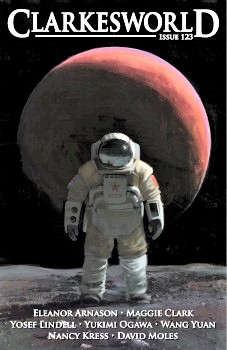 Clarkesworld #123, December 2016
Clarkesworld #123, December 2016
“A Tower for the Coming World” by Maggie Clark
Reviewed by Christos Antonaros
The first story of Clarkesworld’s December issue, “A Tower for the Coming World” by Maggie Clark, begins with an accidental liquid-oxygen tank explosion and a funeral. Through the eyes of different characters and timelines, we witness how humankind came to pollute and destroy planet Earth and to establish colonies in outer space. Through excellent narration, we follow a brief history lesson, full of natural disasters caused by climate change, civil wars, and politics. A fictional prophecy which states that the future is not that different than the present if we do not act appropriately. However, despite the pessimism we receive a hopeful message that awaits us at the end: it is in our hands to fix what we, or our ancestors, destroyed, even if it means we need to override fundamental rules.
The next short story, “Painter of Stars” by Wang Yuan, does not get lost in Andy Dudak’s fine translationt. Through the artificial perception of a droid made to sweep floors, we witness the beginning of a love story, between the droid’s master and his girlfriend, the seed of their love, called Angel, and up to the latter’s days as an elder. The Droid, however, will get bored of being ignored by its master and even more bored of sweeping floors all day; instead, it cherishes watching and counting the stars outside the window. The droid also hates the fact that it doesn’t have a name. Thus, it chooses its own name, DaVinci. It has not chosen its name randomly, though. Deep inside its circuits it hides an artist, who manifests when DaVinci begins to draw constellations on human flesh, so small that it takes more than a magnifying glass to be seen. The only disappointment about this story is that you want more when it finishes. Great reading with strong messages, such as how art can bring world peace, and a bittersweet ending.
Lydia Duluth is a location scout in space and the protagonist of one of a series of stories called “Checkerboard Planet” by Eleanor Arnason. Lydia secretly approaches a planet that seems to be covered by large different-colored squares, taking the form of a checkerboard. The checkerboard planet is occupied by Nova Terra, a corporation of looters from another planet who is exploiting the planet’s prosperity in secret, instead of studying its extraordinary natural complexity. Lydia’s mission is to investigate in secret, with a fake identity, if Nova Terra’s looters are intervening with the evolution of an intelligent lifeform. This story brings an excellent question to the table: Should we allow a new life to evolve based on our image, or should we cut any ties and let it evolve by itself? What if copying our habits is their only way to evolve? What do we do then? A brilliant read, with fascinating characters, whether human or not.
Next comes the unique short story “Blue Gray Blue” by Yukimi Ogawa. In a parallel reality, or a distant planet, the moment colors begin disappearing they gain a vital importance in people’s lives. Tsuyu falls for Ai, a charming woman who claims that she is a “blues collector,” and she definitely doesn’t mean the music genre. While more strange phenomena of missing colors happen, and through a demonstration of how rare some colors have become, Tsuyu comes to discover that Ai hides some dangerous secrets. Every bit of dialogue, image, or inner monolog is so perfectly coordinated with the story’s theme that you cannot help but enjoy every moment. Even though the English language is not the author’s native language, she manages to grab our attention from the very first paragraphs.
In “A Future Far Too Bright” by Yosef Lindell, Jesse, a third-grader, exchanges letters with his father, who is a time-traveler. Every time he mentions his father’s occupation however, everyone, excluding his mother, is laughing at him. Jesse misses his father, day by day, even more, up to the point he decides he needs to do something about it with the help of his friend Julia May. Fascinating reading, with a unique way of narrating the dialogue of a father and his son. The tone of young Jesse’s written observations on life, on each of his letters, is perfectly done. At the end of the story, we come to realize that sometimes lying does not mean a ticket to hell necessarily.
Christos Antonaros wishes Merry Christmas and a Happy New Year to all the readers out there. Even the ones in outer space…